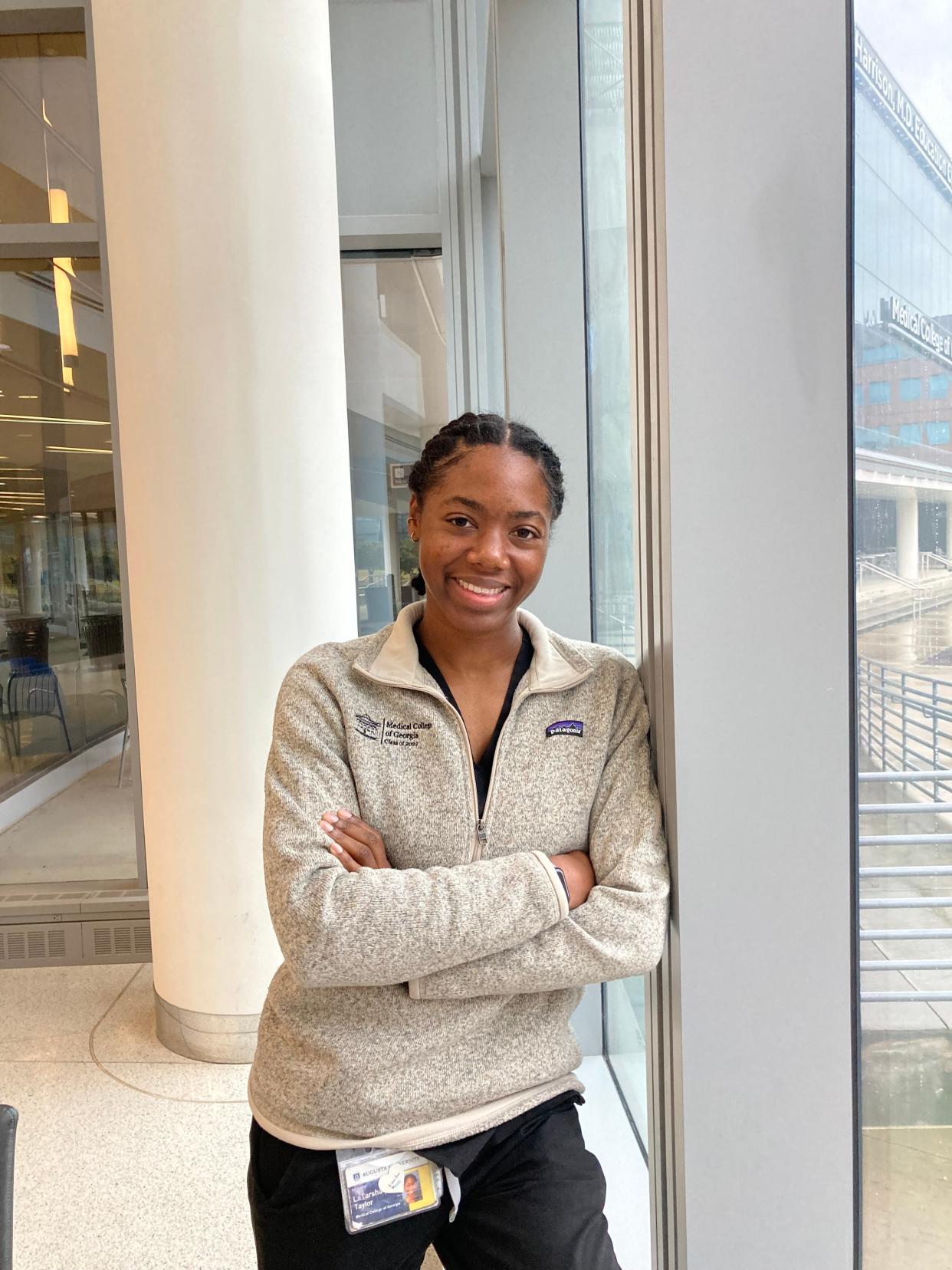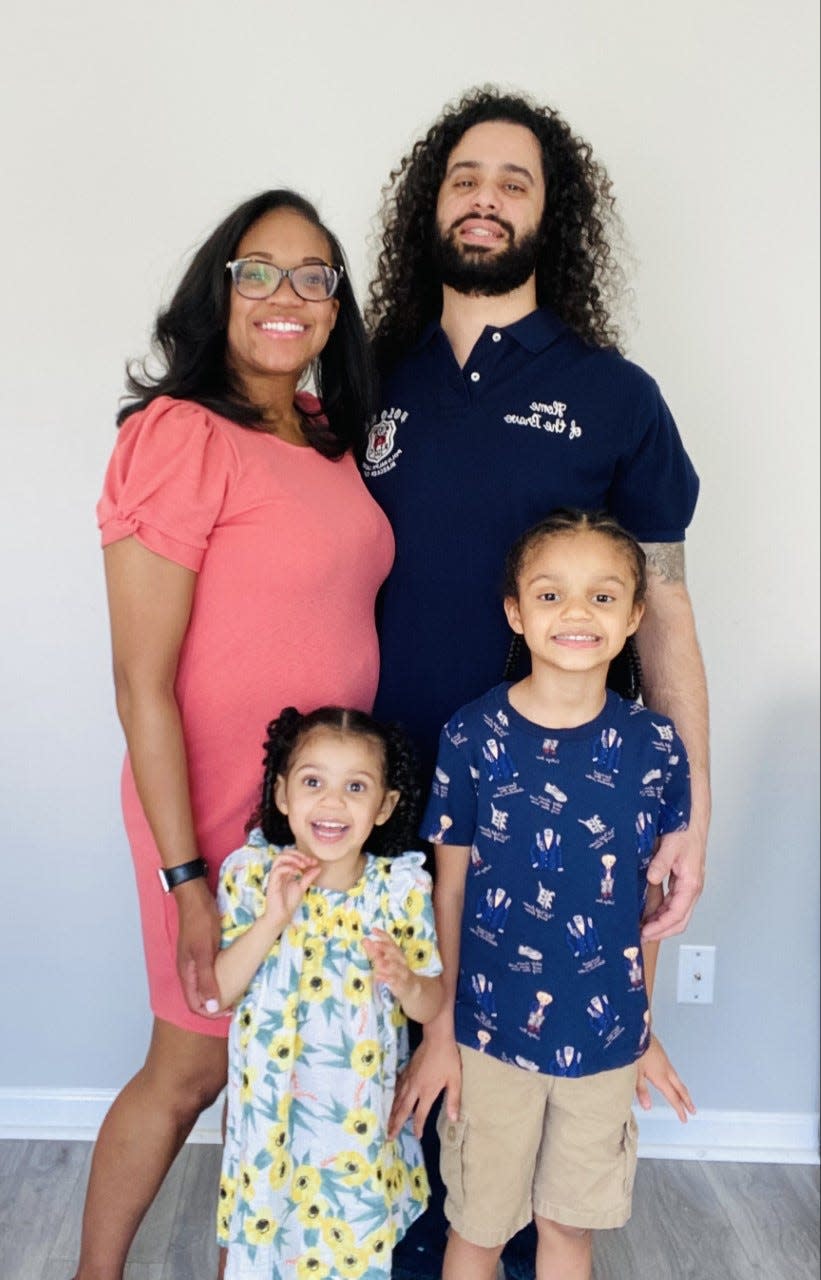'A seat at the table': Black MCG students aim to broaden least-diverse medical specialties

The tiny fraction almost made Medical College of Georgia student LaTarsha Taylor flinch when she heard it — of the nearly 16,000 orthopedic surgeons in the U.S., there are 50 who are Black women like her. She jokes that she tries to avoid looking at the numbers, but those odds haven't deterred her, either, from pursuing that field.
"I just knew coming in that was a goal of mine and I wasn’t going to let anything scare me away from it," Taylor said. "There’s not many — I knew I wasn’t going to be the first and I know I am not going to be the last."
She and her classmates at Medical College of Georgia at Augusta University will find out where they will spend their residencies and the next several years learning their craft this Friday during Match Day, when senior medical students receive their notifications. Senior medical students like Taylor were told earlier this week if they have matched with a residency, they just don't know which one yet.
They and some of their classmates are breaking into very competitive specialties that have traditionally been the least diverse medical fields in the U.S.
A 2017 article in JAMA Dermatology noted that Orthopedic Surgery and Dermatology had the worst ratio of Black practitioners to white. A recent special report from the Association of American Medical Colleges bears that out.
According to "Diversity in Medicine: Facts and Figures 2019," there were 309 Black female dermatologists, which represented 2.86% of all dermatologists, according to an analysis by The Augusta Chronicle. Three-fourths of dermatologists are white, although white women outnumber white men 4,144 to 3,964, according to the analysis.
The 50 Black female orthopedic surgeons account for 0.3% of all orthopedic surgeons. White men make up the majority of orthopedic surgeons at 75% and women account for only 6.3% of that specialty, Chronicle analysis found.
Even after making diversity a priority in 2009, America's medical schools haven't made much headway a decade later, the report found. This was due in part to a lack of underserved minority candidates applying to medical school, which has remained flat and is actually lower for Black men than it was in the late 1970s, research showed. All of the 20 orthopedic residents currently at the Medical College of Georgia are male, and the majority are white.
Black candidates and those seeking residencies also must contend with a persistent structural racism and stereotyping despite these efforts, which occur not only in academic programs like residencies but in private practice as well, the report found. According to an article in the Journal of Bone and Joint Surgery, more than 80% of female residents said they had experienced bullying or sexual harassment.

Shantelle Griffith can add one more potential hurdle for getting into the coveted dermatology residency she is seeking — she is a Black mother with two young children. In the past that could have caused programs to disregard her ability to commit to the training. Griffith did not shy away from addressing that in interviews, noting her husband, Kenny, and the family had uprooted to come to MCG and now would be willing to follow her anywhere in the country.
"I felt like I had to prove my capabilities, but I had to re-emphasize my determination and passion for this and that I would do whatever was required," she said.
And she is evaluating those residencies with just as careful an eye. To the list that most medical students have for what they are looking for in a residency program, "I had to add like an extra 10 checkboxes" for her family, Griffith said. She also has had to consider whether she could find an affordable home in that area, in a neighborhood with good schools where she would be comfortable with her children playing outside.
More: 'Minority tax,' fitting in, finances among struggles Black students face in medical school
MCG: Medical College of Georgia grant to recruit minority researchers in heart, metabolic field
She liked dermatology from the start "but then when I saw how competitive it was even to match I started discouraging myself," she said, telling herself, "You need to find something that is more attainable." But despite her best efforts to fall in love with something else, Griffith found "this isn’t really fulfilling me, this isn’t filling my cup," she said. "I need to go into dermatology."
There was never a question about orthopedics for Taylor in part because of her own patient experience. As a star high school basketball player in Valdosta, recruiters were starting to look her way before she suffered knee injury after knee injury.
"Once that starts to happen, interest quickly fades," Taylor said. But it was while she was going through that process and spending time around an orthopedic surgeon that it clicked for her and she saw her love for biology and science in a new way.
"Once I saw I could include the sports medicine aspect of it with science and taking care of people, it all made sense," Taylor said. "It was really an epiphany moment for me back then."
She couldn't wait to share her gains and progress with her surgeon, who was also there for her when she tore a ligament again and shared in "that moment of grief," Taylor said. "It was those shared goals of the journey that I really appreciated and I wanted to do that for someone else. I wanted to be that pillar, that person for the next person behind me."
Having been an athlete who has had those dreams and those setbacks will allow Taylor to be in those moments with her patients.
"Especially when you are a kid, when you are thinking about college, it is your whole world," she said. "So when that comes down, it comes crashing. You just don’t have the perspective." As her surgeon comforted her, she will comfort those to come: "We’re going to get you back. This is going to be OK."
Her surgeon, like most in orthopedics, was a white man and Taylor hopes to emulate him. But she can remember the first time she saw a Black woman surgeon, at MCG during a summer enrichment program while she was still an undergraduate. It was after her first year of medical school when she met a Black female orthopedic surgeon for the first time.
"I wish I had seen those women sooner," she said. "I always knew I could do it but didn’t know there were others that looked just like me, and how that looked and how that felt to be in the room with that type of energy. It changes the whole game. That one day, that one hour with them changes everything."
Because of the predominance of white men, many of them former athletes, there has been a stereotype of a "bro culture" in orthopedic surgery to those outside the field, which Taylor said is mostly unfair and not really representative of those she has gotten to know.
"Orthopedics has room for anyone and everyone with any type of personality," she said. "I wouldn't let that 'bro culture' deter me or anyone else."
Being that mentor, however that happens in her career, is something Taylor knows will be part of her life ahead.
"I wouldn’t be here without people reaching back and helping me and telling me I could do it," she said. "I absolutely want to be that person” for someone else.
Griffith doesn't consider it a responsibility but "an honor" to be called upon to do that.
"Someone took a chance on us," she said. "Someone saw us, believed in us, felt like we deserved a seat at the table and they made room for us."
As she goes through her career, "I am going to use where I am to help and guide and advise whoever comes after me," Griffith said.
This article originally appeared on Augusta Chronicle: Black MCG students take aim at least-diverse medical field on Match Day

